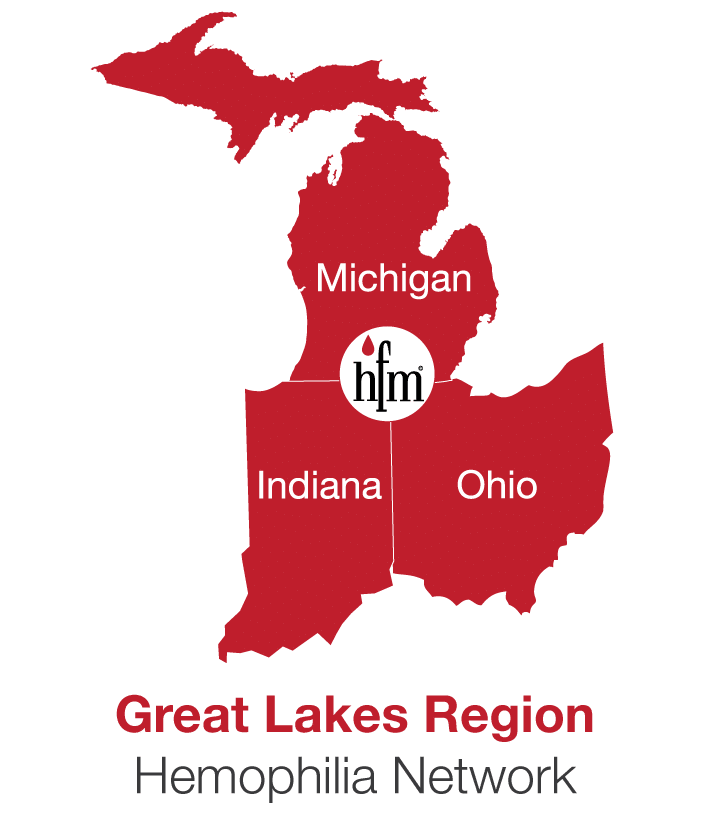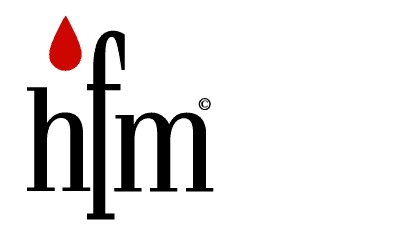The Great Lakes Regional Hemophilia Network

The Hemophilia Foundation of Michigan Serves as the Regional Core Center for the Great Lakes Regional Hemophilia Network. This region includes 19 federally-funded HTCs in Indiana, Michigan, and Ohio. As the Regional Core Center, HFM has several responsibilities; one of the most important is that HFM works to ensure that patients with bleeding disorders and their families have access to comprehensive, multi-disciplinary care. HFM also has administrative and fiduciary duties over the federal funding from HRSA and the CDC. As part of the regional structure, HFM works with our national, regional, and local partners to ensure that our grant goals and objectives are met and to identify emerging issues and needs. (For purposes related to the CDC grant and Community Counts Project, the Great Lakes Region is named Region V-East.)
HFM provides educational and support opportunities for the HTCs in the Great Lakes Region. HFM hosts in-state HTC meetings for staff to meet during the year to discuss educational programming, HTC needs, and other current issues that staff are facing. These meetings are open to all HTC staff and allow for collaboration outside of the typical HTC setting. HFM also provides an annual Regional Meeting for staff from around the region. Topics and presentation are based upon suggestions from with our region throughout the year and opportunities are provided for attendees to earn continuing education credits.
Hemophilia Treatment Centers
Hemophilia Treatment Centers (HTCs) are clinics that specialize in providing comprehensive, multidisciplinary care for patients with hereditary bleeding and clotting disorders. This multidisciplinary care team includes hematologists, nurses, social workers, physical therapists, and other specialists.
There are over 130 federally-funded HTCs across the United States that are divided into eight regions. These regions are supported by the Maternal and Child Health Bureau (MCHB) of the Health Resources and Services Administration (HRSA). The Centers for Disease Control and Prevention (CDC) also provides funding to the regions through a separate grant administered by the American Thrombosis and Hemostasis Network (ATHN). This grant funded by the CDC supports the Community Counts Project – a surveillance project for patients with bleeding disorders.
View a list of treatment centers in Michigan, Indiana, and Ohio
MCHB Regions
- New England – Connecticut, Maine, Massachusetts, New Hampshire, New Jersey, New York, Puerto Rico, Rhode Island, Vermont
- Mid-Atlantic – Pennsylvania, Delaware, Maryland, West Virginia, Virginia
- Southeast – Kentucky, North Carolina, South Carolina, Tennessee, Mississippi, Alabama, Georgia, Florida
- Great Lakes – Michigan, Ohio, Indiana
- Northern States – Illinois, Wisconsin, Minnesota, North Dakota, South Dakota
- Great Plains – Arkansas, Kansas, Iowa, Louisiana, Oklahoma, Missouri, Nebraska, Texas
- Mountain States –Alaska, Arizona, Colorado, Idaho, Montana, New Mexico, Oregon, Utah, Washington, Wyoming
- Western States – California, Nevada, Hawaii, Guam
Resources
2023 Regional Meeting Planning Committee:
New Members
- Michael Altese, PharmD, Pharmacy Director, Cascade Hemophilia Consortium
- LaMonica Bronaugh MSW, LSW, Medical Social Worker, Northwest Ohio Hemophilia Center
- Christian (CJ) Hansen, BSN, RN, Nurse Coordinator, Ohio State University Hemophilia Treatment Center
- Anji Heath, Educational Program Manager, University of Nebraska Medical Center
- Jennifer Kerns, BS, RDH, Dental Hygienist, Northern Regional Bleeding Disorder Center
- Shannon Tracey MSW, LCSW, Psycho-Social Team Manager, Indiana Hemophilia & Thrombosis Center
- Stephanie Smith, Data Coordinator, Northern Regional Bleeding Disorder Center
- Indryas Woldie, MD, Detroit Receiving Hospital & University Medical Center Comprehensive Center for Bleeding Disorders and Thrombosis
Returning Members
- Nancy Inverso, RN, Nurse Coordinator, Bronson Hemophilia Treatment Center
- Heidi Keeler, PhD., RN, Director, Continuing Nursing Education, University of Nebraska Medical Center
- Magdalena Lewandowska, MD, Indiana Hemophilia and Thrombosis Center Anjella Heath, Educational Projects Coordinator, University of Nebraska Medical Center
- Fred Loeffler, PT, DPT, LAT, Physical Therapist, Indiana Hemophilia and Thrombosis Center
- Ashley Parmerlee, MSW, LCSW, Medical Social Worker, Indiana Hemophilia and Thrombosis Center
- Renee Paulin, MSN, RN, CWOCN, University of Nebraska Medical Center
Regional Staff
- Lisa Clothier, LMSW, ACSW, LCSW, Regional Program Manager, Great Lakes Region V-E
- Travis Tussing, JD, Regional Coordinator & Federal Grants Director Great Lakes Region V-E
- Sue Adkins, BSN, RN, Regional Program Manager, Great Lakes Region V-E



